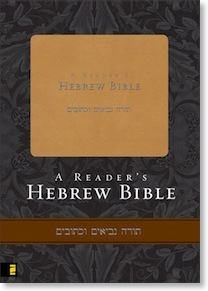Spinti Reviews Zondervan's Forthcoming A Reader's Hebrew Bible
01/21/2008 14:49 Filed in: Faith & Reason

Basic features of the HRB (taken from the Eisenbraun's page) include:
- Complete text of the Hebrew and Aramaic Bible using the Leningrad Codex (minus critical apparatus)
- Shaded Hebrew names that occur less than 100 times
- Footnoted definitions of all Hebrew words occurring 100 times or less (twenty-five or less for Aramaic words)
- Context-specific glosses
- Stem-specific glossed definitions for verb forms (Qal, Piel, Hiphil, and so forth)
- Ketib/Qere readings both noted in the text and differentiated appropriately
- Marker ribbon
- Duo-Tone binding
- Considerable amount of bleedthrough due to thin paper used (the RHB is significantly thinner than the large BHS in keeping with Zondervan's "form-over-function" [my opinion] insistence on thinline Bibles).
- James likes the idea of shading proper nouns, but questions the actual execution of it.
- Points out that some of the words are too far apart because of the text's justification.
- Sees using the same footnote number for a word occurring more than once on a page to be an improvement over Zondervan's A Reader's Greek New Testament.
- Notes that the underlying text is the same as the BHS unlike both editions of the RGNT which departed from the UBS/NA Greek New Testament.
- James concludes that he would not use the RHB because his Hebrew is good enough to not need it; however, he would recommend it to those whose Hebrew skills were lacking. Says he would recommend it more heartily if the paper were not so thin.
As I mentioned in my review of the Greek counterpart to this edition, I am enthusiastic about these kinds of tools because they help students and ministers stay in the original languages and maintain them after seminary education. I've found it handy to carry a Greek NT of this sort with me to church because I don't also want to lug around a lexicon on Sundays.
With four months to go before the final release of the RHB, it will be interesting to see if Zondervan can address any of the shortcomings in this early release.
Also of interest:
- Zondervan's page for A Reader's Hebrew Bible
- My review of Zondervan's A Reader's Greek New Testament, second edition
- My review of The UBS Greek New Testament: A Reader's Edition









